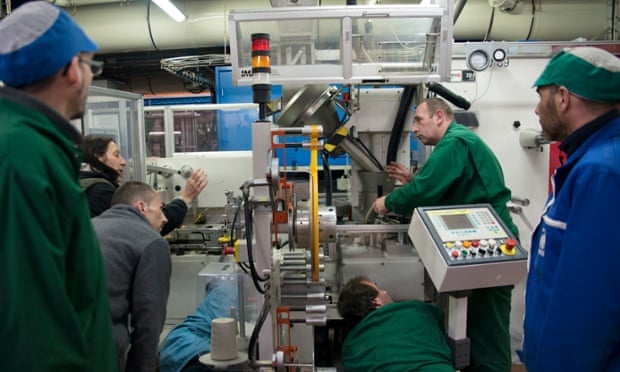|
   
- UID
- 13448
- 帖子
- 2922
- 精华
- 0
- 注册时间
- 2009-3-1
访问个人博客
|
楼主
 发表于 2015-5-5 17:32
发表于 2015-5-5 17:32
| 只看该作者
[转帖] May Day: workers of the world unite and take over – their factories
A 19th-century slogan is getting a 21st-century makeover. The workers of the world really are uniting. At least, some of them are.
The economic meltdown unleashed by the 2008 financial crisis hit southern Europe especially hard, sending manufacturing output plunging and unemployment soaring. Countless factories shut their gates. But some workers at perhaps as many as 500 sites across the continent – a majority in Spain, but also in France, Italy, Greece, and Turkey – have refused to accept the corporate kiss of death.

[url=]May Day 2015: share your photos and videos[/url]
How are you marking International Labour Day?
Read more
By negotiation, or sometimes by occupation, they have taken production into their own hands, embracing a movement that has thrived for several years in Argentina.
Advertisement
<IFRAME id=google_ads_iframe_/59666047/theguardian.com/world/article/ng_1 style="BORDER-LEFT-WIDTH: 0px; BORDER-RIGHT-WIDTH: 0px; VERTICAL-ALIGN: bottom; BORDER-BOTTOM-WIDTH: 0px; BORDER-TOP-WIDTH: 0px; border-image: none" height=250 marginHeight=0 src="javascript:""" frameBorder=0 width=300 name=google_ads_iframe_/59666047/theguardian.com/world/article/ng_1 marginWidth=0 scrolling=no>
In France, an average of 30 mostly small companies a year, from phone repair firms to ice-cream makers, have become workers’ co-operatives since 2010. Coceta, a co-operative umbrella group in Spain, reckons that in 2013 alone some 75 Spanish companies were taken over by their former employees – roughly half the total in the whole of Europe.
A gathering in Marseille last year of representatives from worker-controlled factories drew more than 200 delegates from more than a dozen countries – including pioneers from Argentina, whose turn-of-the-century economic crash sparked a wave of fabricas recuperadas that today has left around 15,000 workers in charge at more than 300 workplaces. The fast-developing phenomenon is now a field of academic study; there are websites, such as workerscontrol.net and autogestion.coop, dedicated to it.
No two self-managed ventures launch in the same circumstances, and many face daunting obstacles: bureaucratic inertia and administrative red tape that can delay or even prevent production; legal opposition from former owners; a still-chilly economic climate; outdated machinery, or products no longer in demand. Lifelong union militants can find themselves, for the first time in their lives, making tough commercial decisions.
But many – for the time being at least – are making it work.
Introduction
Contents
France: ‘We decided to fight’Twenty minutes’ drive from the old port of Marseille, on a green and well-groomed industrial park outside the Provençal village of Gémenos, is Fralib, the largest tea factory in France.
Every year, 250-odd workers here turned six tonnes of carefully cured leaves into more than 2bn sachets of Lipton and Eléphant brand flavoured and scented teas – lemon, mint, Earl Grey – and soothing herbal infusions: linden, camomile, verbena.
But in September 2010, having spent five years steadily shifting half the factory’s production to Poland, its owner, the Anglo-Dutch consumer goods giant Unilever, summarily announced it was closing the site.

FacebookTwitterPinterest
Tea junction: Fralib workers prepare to revive their factory. Photograph: Yohanne Lamoulère “It was … shocking,” said Olivier Lerberquier, a CGT union convenor at the factory. “Unilever France had just paid a huge dividend to shareholders. Fralib, this place, was profitable, even at half capacity. We decided to fight.”
It has been, by any standards, a long battle, but it seems nearly over: next month, 57 ex-Fralib employees, now reformed into a self-managed workers’ co-op, will switch on their machines again, and a factory silent for half a decade will once more produce tea.
Standing four-square in the cavernous main production hall at Gémenos, as long-underemployed operators checked pristine machinery and freshly trained technicians tested new quality-control equipment, Leberquier said few in France would have bet on the factory’s remaining workers getting this far.

FacebookTwitterPinterest
Olivier Leberquier, union man. Photograph: Yohanne Lamoulère “In the end, though, the length of the fight – 1,336 days, it was – almost helped us,” he said. “We got time to build solidarity, and a solid business plan. And even if, like our lawyer says, we’re now ‘condemned to succeed’, at least we know, for sure, that we have as good a chance as anyone.”
Advertisement
<IFRAME id=google_ads_iframe_/59666047/theguardian.com/world/article/ng_2 style="BORDER-LEFT-WIDTH: 0px; BORDER-RIGHT-WIDTH: 0px; VERTICAL-ALIGN: bottom; BORDER-BOTTOM-WIDTH: 0px; BORDER-TOP-WIDTH: 0px; border-image: none" height=50 marginHeight=0 src="javascript:""" frameBorder=0 width=300 name=google_ads_iframe_/59666047/theguardian.com/world/article/ng_2 marginWidth=0 scrolling=no>
The workers also got money. Unilever submitted four successive redundancy plans for the 182 people still employed at Fralib in 2010. All – including one proposal to relocate to Poland on an annual salary of |
|



